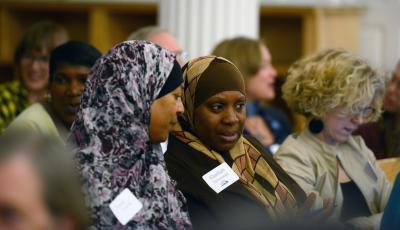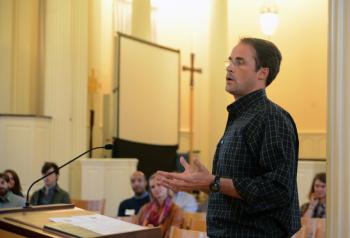It began and ended with compost.
The Nourish New Haven conference at Yale Divinity School got down into the dirt of environmental activism on Sept. 19-20, bringing activists, local community members, and YDS students together for a weekend devoted to food and justice.
Fred Bahnson, an author and teacher, and Pashon Murray, an entrepreneur and activist, provided the beginning and ending keynote addresses. Each explored themes of community and sustainability—and, yes, compost. Between these addresses, panels and sessions highlighted different aspects of food justice and environmental activism.
New Haven roots
As the conference’s title proclaims, the weekend was not interested in these themes—sustainability, activism, community, and food—in the abstract. Instead, a sense of rootedness in the place of New Haven – guided much of the talk and conversation.

And with good reason. Conference organizer James Jenkins, ’15 M.Div, said the idea grew from his own desire to foster partnerships that together can fight for change.
“Nourish New Haven embodies the possibilities of what the university and the community can accomplish together,” Jenkins said.
YDS Dean Greg Sterling affirmed the importance of this goal to the mission of this school.
“The theme of our year is building sustaining communities,” Sterling told conference participants.
And indeed, the importance of relationships for the work of the environmentalist movement resounded across the weekend.Andy Barnett ’12 M.Div. ’12 M.E.M. said it most succinctly. “It’s not possible to love your neighbor without working for food justice and on climate change,” he said.
Barnett, who has done food justice work for the Episcopal Diocese of Los Angeles, highlighted the connection between the Christian commitment to community and the work of environmental activism.
During his time as a student, Barnett was among those who pushed for the creation of the student-run Divinity Garden, where YDS students and families still cultivate seasonal fruits and vegetables.
In their own ways, each of the keynote speakers turned to themes of relationship.
Bahnson is the director of the Food, Faith, and Religious Leadership Initiative at Wake Forest University and the author of Soil and Sacrament: A Spiritual Memoir of Food and Faith (Simon & Schuster, 2013). In his opening address he read a passage from his book and discussed his experiences living in four different religious communities.
Bahnson connected traditional Christian ideas about hospitality with concerns about the quality and environmental impact of industrial agriculture.
“Why feed the stranger industrial crap? We need to feed people the best,” Bahson said. “That is starting to change and conferences like this are a part of that.
Dust to dust, soil to soil
Murray is the co-founder of Detroit Dirt, a company that produces compost and works to turn abandoned land in Detroit into urban farms. She’s also an MIT Media Labs Fellow and the star of Ford’s commercial “Upside.”
Murray described her own work as containing a significant relational component.
“My main focus for what I do is bringing people together in the sustainable movement,” she said. This mission is rooted in her faith, and she sees spiritual significance in the work of reusing and repurposing waste and turning it back to compost.
“We’re connected to the soil, all of us, from the dust of the earth,” she said. “We’re only inheriting the earth, we don’t own.
Alex Dyer, priest-in-charge of the Episcopal Church of St. Paul and St. James in New Haven, was in attendance at the conference and provided some of his perspective as the executive director of the Loaves and Fishes Food Pantry based at his church.
During a session on Local Approaches to Addressing Food Insecurity Dyer echoed Bahnson and pointed to a shift in perspective in the way food ministries operate.
“The ground is shifting. The attitude used to be that you just give out calories, but that is changing,” he said. “We need to be more strategic now.”
Dyer also pointed out other changes. Loaves and Fishes, which distributes food weekly, has seen a real increase in need
The conference also hosted sessions on “Urban Agriculture and Community Gardening,” “Factory Farming Exposed,” and “Eating for Our Climate.”
Conference attendees had the opportunity to hear from representatives of the New Haven Food Policy Council, New Haven Farms, and the West River Neighborhood Service Corporation, among other local and grassroots organizations.
 Locally-grown
Locally-grown
This was the second Nourish New Haven conference, with the first occurring in February of 2013. Both have been organized by James Jenkins ’15 M.Div. whose environmental leadership at YDS was recognized by the Yale Office of Sustainability earlier this year.
Jordan Conerty ’16 M.Div., one of the YDS’s Sustainability Coordinators, was also on hand throughout the weekend, helping to make sure things went well. He saw a dual purpose to the event.
“Food work is hard work and it’s dirty work,” Conerty said. “The conference was educational, but also celebratory. It was about creating a space in our community for others to come in and share their stories. It was encouraging and affirming to those who do the work.”
He was also personally enriched by the opportunity to connect the abstract with the concrete. He appreciated the opportunity to speak with Bahnson about initiatives and actions happening in other places but was able to meet local leaders doing much the same kind of work.
Said Conerty, “To have that personified and rooted in my neighbor across the street fired me up.”
| Attachment | Size |
|---|---|
| 1.44 MB | |
| 1.95 MB |